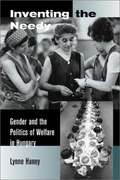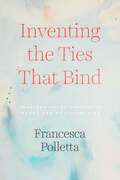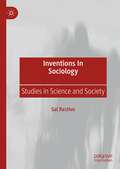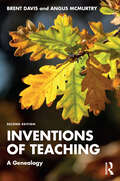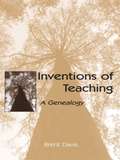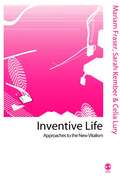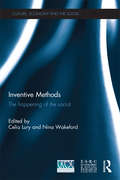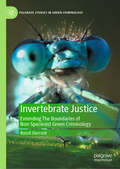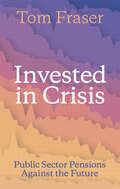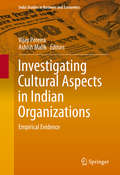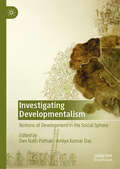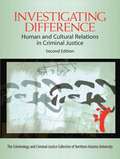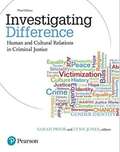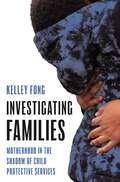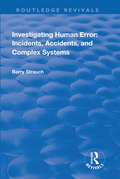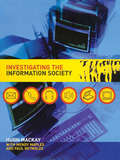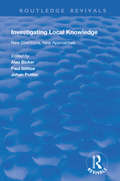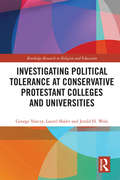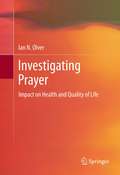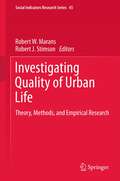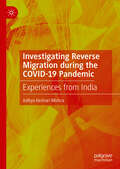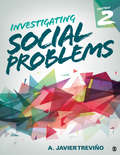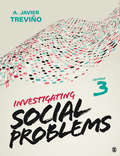- Table View
- List View
Inventing the Needy: Gender and the Politics of Welfare in Hungary
by Lynne A. HaneyThis ambitious, fluid, and engaging book explains the political and social transformation of the Hungarian state from 1948 to the present. Haney reconceptualizes how we might understand the momentous changes of 1989, resisting the usual categories of the socialist past and the capitalist present.
Inventing the Ties That Bind: Imagined Relationships in Moral and Political Life
by Francesca PollettaFrom deciding to hold the door for the person behind you, to resolving for whom you will cast your vote, every day we find ourselves charged with making moral decisions. What steers our choices? And how do we weigh competing priorities and moral convictions? In Inventing the Ties That Bind, Francesca Polletta shows that we do not solve these dilemmas, whether personal or political, based on self-interest alone. Instead, relationships serve as a kind of moral compass. People consider the nature of their ties to one another to know what their obligations are, and in situations that are unfamiliar, they sometimes figure out the right thing to do by imagining themselves in relationships they do not actually have. Polletta takes up a wide range of cases, from debt settlement agencies to the southern civil rights movement, revealing that our relationships and how we imagine them are at the heart of our moral lives—guiding us as we choose whom to help and how we define what it means to treat someone as our equal. In a time of growing polarization, understanding how we make sense of our ties to one another is more urgent than ever.
Inventions in Sociology: Studies in Science and Society
by Sal RestivoThis book presents a collection of old and new essays exploring the author’s unique contributions to the sociology of science, mathematics, logic, robotics, brain, and god. Known for his defense of a strong social constructionist approach to the hard problems in the sociology of science, the power and range of Restivo’s interests and studies are discussed in this unique text. The essays range from his introduction of the sociology of objectivity early in his career to his recent construction of a social brain paradigm. The author situates himself in the context of the leading paradigms in science studies and his relationships with leading figures in the field including Latour, Woolgar, Needham, and D.T. Campbell. The book demonstrates a general theoretical focus on the rejection of transcendence. He rejects Platonism in mathematics and socially situates consciousness, genius, and God. The author’s wide ranging interdisciplinary competencies reflect classical and postmodern influences and will be an invaluable reference for researchers working in this field.
Inventions of Teaching: A Genealogy
by Brent Davis Angus McMurtryThis updated edition of Inventions of Teaching: A Genealogy presents an examination of the many and varied metaphors of teaching in English. These metaphors serve as sites to excavate conflicting historical, con-ceptual, and philosophical influences that have contributed to modern teaching practices.Though the Eurocentric perspectives of the first edition remain a focus, they are placed in a broader context that acknowledges their, as the authors coin it, ‘WEIRDness’ (i.e., western, educated, industrialized, rich, democratic nature). In this revised and expanded edition, these perspectives are accompanied by multiple case studies of non-Western and Indigenous educational traditions. Chapter discussions are organized as a genealogy around key conceptual bifurcations in thought rather than case-by-case analysis or a chronology. This structure allows the authors to examine the origins of distinctions that are often taken for granted, such as cognitivism vs. behaviorism, or constructivism vs. positivism. The genealogy develops around breaks in opinion that gave or are giving rise to diverse interpretations of knowledge, learning, and teaching--highlighting historical moments in which vibrant new figurative understandings of teaching emerged. A new chapter has been added, addressing the habits of interpretation needed to render the ‘WEIRD’ world sensible; alongside a much elaborated closing discussion, intended to bring WEIRD inventions of teaching into sharper relief by contrasting them with non-WEIRD cultures and some of their approaches to teaching.Inventions of Teaching: A Genealogy is an informative text for senior undergraduate and graduate courses in curriculum studies and foundations of teaching, It is also relevant for students, faculty, and researchers across the field of education who want to explore the consequences of diversities of opinion, belief, and practice concerning teaching and closely related topics of learning, knowing and formal education.
Inventions of Teaching: A Genealogy
by Brent DavisInventions of Teaching: A Genealogy is a powerful examination of current metaphors for and synonyms of teaching. It offers an account of the varied and conflicting influences and conceptual commitments that have contributed to contemporary vocabularies--and that are in some ways maintained by those vocabularies, in spite of inconsistencies and incompatibilities among popular terms. The concern that frames the book is how speakers of English invented (in the original sense of the word, "came upon") our current vocabularies for teaching. Conceptually, this book is unique in the educational literature. As a whole, it presents an overview of the major underlying philosophical and ideological concepts and traditions related to knowledge, learning, and teaching in the Western world, concisely introducing readers to the central historical and contemporary discourses that shape current discussions and beliefs in the field. Because the organization of historical, philosophical, theoretical, and etymological information is around key conceptual divergences in Western thought rather than any sort of chronology, this text is not a linear history, but several histories--or, more precisely, it is a genealogy. Specifically, it is developed around breaks in opinion that gave or are giving rise to diverse interpretations of knowledge, learning, and teaching--highlighting historical moments in which vibrant new figurative understandings of teaching emerged and moments at which they froze into literalness. The book is composed of two sorts of chapters, "branching" and "teaching." Branching chapters include an opening treatment of the break in opinion, separate discussions of each branch, and a summary of the common assumptions and shared histories of the two branches. Teaching chapters offer brief etymological histories and some of the practical implications of the terms for teaching that were coined, co-opted, or redefined within the various traditions. Inventions of Teaching: A Genealogy is an essential text for senior undergraduate and graduate courses in curriculum studies and foundations of teaching and is highly relevant as well for students, faculty, and researchers across the field of education.
Inventive Life: Approaches to the New Vitalism (Published in association with Theory, Culture & Society)
by Sarah Kember Dr Mariam Fraser Celia LuryThis book demonstrates how and why vitalism - the idea that life cannot be explained by the principles of mechanism - matters now. Vitalism resists closure and reductionism in the life sciences whilst simultaneously addressing the object of life itself. The aim of this collection is to consider the questions that vitalism makes it possible to ask: questions about the role and status of life across the sciences, social sciences and humanities and questions about contingency, indeterminacy, relationality and change. All have special importance now, as the concepts of complexity, artificial life and artificial intelligence, information theory and cybernetics become increasingly significant in more and more fields of activity.
Inventive Methods: The Happening of the Social (CRESC)
by Celia Lury and Nina WakefordSocial and cultural research has changed dramatically in the last few years in response to changing conceptions of the empirical, an intensification of interest in interdisciplinary work, and the growing need to communicate with diverse users and audiences. Methods texts, however, have not kept pace with these changes. This volume provides a set of new approaches for the investigation of the contemporary world. Building on the increasing importance of methodologies that cut across disciplines, more than twenty expert authors explain the utility of 'devices' for social and cultural research – their essays cover such diverse devices as the list, the pattern, the event, the photograph, the tape recorder and the anecdote. This fascinating collection stresses the open-endedness of the social world, and explores the ways in which each device requires the user to reflect critically on the value and status of contemporary ways of making knowledge. With a range of genres and styles of writing, each chapter presents the device as a hinge between theory and practice, ontology and epistemology, and explores whether and how methods can be inventive. The book will be a valuable resource for students and scholars of sociology and cultural studies.
Invertebrate Justice: Extending The Boundaries of Non-Speciesist Green Criminology (Palgrave Studies in Green Criminology)
by Russil DurrantInvertebrates are the neglected majority of the animal world. Even though they make up over 95% of animal life, they rarely feature in discussions of speciesism, animal ethics or species justice. This book aims to extend the work of non-speciesist criminologists to argue for the idea of ‘invertebrate justice’. Utilizing green criminologist Rob White’s (2013) eco-justice perspective, the book demonstrates how our interactions with invertebrate species (insects, crustaceans, molluscs and so forth) cause a significant amount of harm to those animals themselves (species justice), the ecosystems in which they are embedded (ecological justice), and ultimately to humans (environmental justice). Across three sections, it provides an overview of the ways in which humans and invertebrates interact across a diverse range of contexts and reviews the literature on both invertebrate biodiversity and invertebrate sentience; builds a theoretical framework that can help us understand what invertebrate justice might mean; and tackles the difficult question of how best we can promote invertebrate justice in the future. It appeals to academics, environmental scientists, activists and policymakers.
Invested in Crisis: Public Sector Pensions Against the Future
by Tom FraserAll workers deserve access to a safe and secure retirement. But neoliberal governments set up a dynamic where the retirement of some is predicated upon the exploitation of many. In the late-1980s, Ontario’s government, financial sector, and labour movement collaborated on a major restructuring of the province’s public sector pensions. The result? The unlocking of a vault containing billions of dollars, suddenly open to be privately invested in capital markets. All this occurred as Ontario’s manufacturing economy got smaller, its care economy got bigger, and its labour movement got weaker. In Invested in Crisis, Tom Fraser traces the rise of the province’s mega-pension-funds by melding history, geography, and political economy to situate this growth in the context of Ontario’s deindustrialization, the rise of finance, and the global politics of the built environment. Fraser delves deep into the sordid stories of the public sector pension fund investment world: the massive real estate projects, the infrastructure privatization debacles, how unions fight back, and what needs to be done so we can all save for a better future.
Investigating Cultural Aspects in Indian Organizations
by Vijay Pereira Ashish MalikThe purpose of this edited collection is to analyse the cultural aspects of Indian organizations. As the world's largest and most diverse democracy, Indian society can be best described as an amalgam of multiple cultures, value systems, socio-political and institutional orientations. This book offers a theoretical and empirical basis for understanding the evolving and changing nature of these aspects in Indian organizations. The World Bank predicts that in the near future India will become the world's second largest economy. The recent high growth rates reported by businesses in the Indian economy needs to be sustainable, especially amidst its high cultural diversity. Whilst there is tremendous interest in understanding the intricacies of Indian culture and a growing literature focusing on topics such as India-specific management and internationalization strategies of Indian firms, the cultural aspects of Indian businesses have been largely ignored. This book aims to fill this gap. It covers various topics in organizational culture and management such as human resource management, cross-cultural communication and coaching, cultural similarity, cultural literacy, multiculturalism, generational cultural values, talent acquisition and knowledge management. It also features case studies from high growth sectors such as the IT and health industries. Presenting contributions from local Indian and international researchers, this book provides a multidimensional perspective that will appeal to students, scholars and practitioners interested in organizational culture and management in India.
Investigating Developmentalism: Notions of Development in the Social Sphere
by Dev Nath Pathak Amiya Kumar DasCompiling various strands of the dis/enchantment with development discourse in contemporary South Asia, with specific focus on the cases from India, this edited book brings together anthropologists, sociologists, economists, and historians to refresh the understanding of development. It introduces ways of thinking “otherwise” about development discourse and what the contributors term “developmentalism”—the social enchantment with development. The cultural discourse of development in contemporary South Asia manifests not only in the official programs of state agencies, but in cinema, television, and mass media. Dear to various stakeholders—from government leaders and manufacturers to consumers and the electorate—is the axiom of a “development(al) society.” Organized to bridge familiar understandings of development with radical ways of thinking through developmentalism, this book holds value for those engaged in the anthropology and sociology of development, development studies, South Asian studies, as well as for development professionals working for state and non-governmental organizations.
Investigating Difference: Human and Cultural Relations in Criminal Justice
by Lynn C. Jones Criminal Justice Collective StaffInvestigating Difference examines the full range of individual differences across the entire criminal justice system. Moving beyond just race and gender, it tackles differences based on experience, age, socio-economic class, disabilities and more. Written by a variety of leaders in the field, it looks at how these variances impact all people within the system, including victims, offenders, and service providers. This edition continues to emphasize positive solutions and includes new "case-in-point" illustrations that discuss how difference matters. For anyone interested in the criminal justice system with regard to diversity and multicultural issues.
Investigating Difference: Human and Cultural Relations in Criminal Justice
by Lynn Jones Justine Miller Sarah PriorFor courses that investigate race, class, and gender issues in Criminal Justice. <p><p> A deep exploration of justice―its meaning and administration―through consideration of difference Investigating Difference examines the full range of individual differences across the entire criminal justice system. <p><p>With a focus on positive solutions, the Third Edition moves beyond a prioritization of race to emphasize the multitude of social identity categories that matter in the justice system. Written by esteemed faculty and leading scholars in the field, this edition includes new chapters on intersectionality, specialty courts, and whiteness; newly authored and conceptualized chapters on gender, sexual orientation and gender identity, victimization, African Americans, Asian Americans, immigration, disability, and religion; a look at globalization and its impact on victims, offenders, and practitioners; and updated statistics and policy information throughout.
Investigating Families: Motherhood in the Shadow of Child Protective Services
by Kelley FongHow our reliance on Child Protective Services makes motherhood precarious for those already marginalizedIt&’s the knock on the door that many mothers fear: a visit from Child Protective Services (CPS), the state agency with the power to take their children away. Over the last half-century, these encounters have become an all-too-common way of trying to address family poverty and adversity. One in three children nationwide—and half of Black children—now encounter CPS during childhood.In Investigating Families, Kelley Fong provides an unprecedented look at the inner workings of CPS and the experiences of families pulled into its orbit. Drawing on firsthand observations of CPS investigations and hundreds of interviews with those involved, Fong traces the implications of invoking CPS as a &“first responder&” to family misfortune and hardship. She shows how relying on CPS—an entity fundamentally oriented around parental wrongdoing and empowered to separate families—organizes the response to adversity around surveilling, assessing, and correcting marginalized mothers. The agency&’s far-reaching investigative apparatus undermines mothers&’ sense of security and shapes how they marshal resources for their families, reinforcing existing inequalities. And even before CPS comes knocking, mothers feel vulnerable to a system that jeopardizes their parenthood. Countering the usual narratives of punitive villains and hapless victims, Fong&’s unique, behind-the-scenes account tells a revealing story of how we try to protect children by threatening mothers—and points the way to a more productive path for families facing adversity.
Investigating Human Error: Incidents, Accidents and Complex Systems (Routledge Revivals)
by Barry StrauchThis title was first published in 2002: This volume presents a method to investigate the human performance issues associated with an accident or incident, with a detailed discussion of the types of data to collect, and methods of collecting and analyzing data. The book should be of interest to accident/incident investigators, specialists in nuclear, chemical processing, aviation and other critical industries, safety experts, researchers and students in the field of human error, human factors, ergonomics and industrial engineering, and government agencies for regulation, health and safety.
Investigating Information Society
by Hugh Mackay Paul Reynolds Wendy MaplesThis lively and engaging text introduces students to the major debates and data on the information society, and at the same time teaches them how to research it. It gives an overview of:* theorists of the information society, particularly Manuel Castells and Daniel Bell * social research methodologies, including positivist, interpretivist, critical and cultural * qualitative and quantitative research methods and criteria for social science evaluation.Drawing on a rich body of empirical work, it explores three core themes of information society debates: the transformation of culture through the information revolution, changing patterns of work and employment and the reconfiguration of time and space in everyday life. In exploring these, the reader is introduced through case-studies, activities, and questions for discussion, to the practicalities of doing social research and the nature of social science argument and understanding.
Investigating Local Knowledge: New Directions, New Approaches (Routledge Revivals)
by Paul SillitoeOriginally published in 2004. Local knowledge reflects many generations of experience and problem solving by people around the world, increasingly affected by globalizing forces. Such knowledge is far more sophisticated than development professionals previously assumed and, as such, represents an immensely valuable resource. A growing number of governments and international development agencies are recognizing that local-level knowledge and organizations offer the foundation for new participatory models of development that are both cost-effective and sustainable, and ecologically and socially sound. This book provides a timely overview of new directions and new approaches to investigating the role of rural communities in generating knowledge founded on their sophisticated understandings of their environments, devising mechanisms to conserve and sustain their natural resources, and establishing community-based organizations that serve as forums for identifying problems and dealing with them through local-level experimentation, innovation, and exchange of information with other societies. These studies show that development activities that work with and through local knowledge and organizations have several important advantages over projects that operate outside them. Local knowledge informs grassroots decision-making, much of which takes place through indigenous organizations and associations at the community level as people seek to identify and determine solutions to their problems.
Investigating Political Tolerance at Conservative Protestant Colleges and Universities (Routledge Research in Religion and Education)
by George Yancey Laurel Shaler Jerald H. WalzThis book aims to investigate the level of political tolerance at conservative Protestant colleges and universities. Through innovative and methodologically sophisticated techniques, the authors test the political openness of these institutions as a proxy for their willingness to accept opinions that fall outside of those held by their religious community. The purpose of this study is to determine if there is an insular environment at conservative Protestant institutions beyond religious obligations, or if these institutions are only restrictive as it concerns those theological commitments. Drawing from five distinct sets of data, the authors demonstrate that conservative Protestant institutions of higher education exhibit more political diversity and political tolerance than other institutions of higher education, including elite ‘Research 1’ institutions.
Investigating Prayer
by Ian OlverThis book relates the experience of researching, planning, and conducting a scientific study into intercessory prayer (prayer for others). The purpose of the study was to ascertain whether the impact of prayer could be measured in a formal study, based on the large number of anecdotal reports of efficacy. The study was a prospectively randomized double-blind trial that added prayer by an established Christian prayer group to conventional therapy for cancer. The unique design feature was that the primary endpoint was a change in a validated scale of spiritual well-being. The patients were informed that they were participating in a study about spiritual well-being and quality of life but remained blinded to the intervention. The initial observation from the baseline data was that spiritual well-being made a unique contribution to quality of life. The final outcome of the study was that there was a statistically significant difference in spiritual well-being favoring the prayer group. The background includes a fascinating review of the medical literature on the topic, which contains positive and negative studies that each attracts a vigorous debate about methodology, endpoints, and whether metaphysical phenomena can or should be studied using scientific methodology. The complementary and alternative medicine literature is also equivocal as to whether prayer, arguably the most common complementary medical therapy, should be included in the range of interventions grouped under that heading. In addition to reporting the background and results of the study, the book explores the reactions of a range of individuals to the trial, all of which help reflect on the nature of prayer.
Investigating Quality of Urban Life
by Robert J. Stimson Robert W. MaransThe study of quality of urban life involves both an objective approach to analysis using spatially aggregated secondary data and a subjective approach using unit record survey data whereby people provide subjective evaluations of QOL domains. This book provides a comprehensive overview of theoretical perspectives on QOUL and methodological approaches to research design to investigate QOUL and measure QOL dimensions. It incorporates empirical investigations into QOUL in a range of cities across the world.
Investigating Reverse Migration during the COVID-19 Pandemic: Experiences from India
by Aditya Keshari MishraThis book investigates the critical phenomenon of reverse migration during the COVID-19 pandemic in India, revealing the lived experiences of reverse migrant workers amid unprecedented social and economic upheaval. Through a comprehensive study rooted in the context of India&’s nationwide lockdown, it traces the culture of reverse migration, explores crisis-induced vulnerabilities, and envisions inclusive, empathetic, and transformative policy pathways. Spanning through compelling and insightfully articulated chapters, the volume journeys from conceptual explorations of reverse migration to grounded fieldwork shaped by returnees&’ anguish, adaptation, and resilience. It uncovers the challenges faced by returning migrants—unemployment, food insecurity, and social marginalisation—and critically evaluates government responses and support systems. The final chapter presents a forward-looking policy framework for sustainable migrant reintegration and economic empowerment. Blending scholarly insight with poignant human narratives, this book is an indispensable resource for researchers, policymakers, and readers seeking to understand reverse migration, crisis resilience, and post-pandemic recovery in India.
Investigating Social Problems
by A. Javier TrevinoA. Javier Treviño, working with a panel of experts, thoroughly examines all aspects of social problems, providing a contemporary and authoritative introduction to the field. Each chapter is written by a specialist on that particular topic and the unique, contributed format ensures that the research and examples provided are the most current and relevant available. The text is framed around three major themes: intersectionality (the interplay of race, ethnicity, class, and gender), the global scope of many problems, and how researchers take an evidence-based approach to studying problems.
Investigating Social Problems
by A. Javier TrevinoA. Javier Treviño, working with a panel of experts, thoroughly examines all aspects of social problems, providing a contemporary and authoritative introduction to the field. Each chapter is written by a specialist on that particular topic and the unique, contributed format ensures that the research and examples provided are the most current and relevant available. The text is framed around three major themes: intersectionality (the interplay of race, ethnicity, class, and gender), the global scope of many problems, and how researchers take an evidence-based approach to studying problems.
Investigating Social Problems
by A. Javier TrevinoFor the Third Edition of Investigating Social Problems, editor A. Javier Treviño, has gathered a panel of top experts to thoroughly examine all aspects of social problems, providing students with a contemporary and authoritative introduction to the field. Each chapter is written by a well-known specialist on the topic being covered. This unique, contributed format ensures that the research and examples described are the most current and relevant available. In addition, the experts use both general theoretical approaches (structural functionalism, conflict theory, symbolic interactionism) as well as specialized theories chosen to bring additional insight and analysis to their assigned topics. The text is framed around three major themes: intersectionality (the interplay of race, ethnicity, class, and gender), the global scope of many problems, and how researchers take an evidence-based approach to studying problems. This title is accompanied by a complete teaching and learning package.
Investigating Social Problems
by A. Javier TrevinoFor the Third Edition of Investigating Social Problems, editor A. Javier Treviño, has gathered a panel of top experts to thoroughly examine all aspects of social problems, providing students with a contemporary and authoritative introduction to the field. Each chapter is written by a well-known specialist on the topic being covered. This unique, contributed format ensures that the research and examples described are the most current and relevant available. In addition, the experts use both general theoretical approaches (structural functionalism, conflict theory, symbolic interactionism) as well as specialized theories chosen to bring additional insight and analysis to their assigned topics. The text is framed around three major themes: intersectionality (the interplay of race, ethnicity, class, and gender), the global scope of many problems, and how researchers take an evidence-based approach to studying problems. This title is accompanied by a complete teaching and learning package.
